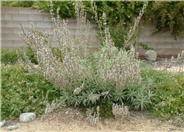
Common name:White Sage, Sacred White Sage, Bee
Botanical name:Salvia apiana
This woody shrub has long stems with silvery white leaves and fragrant white flowers that bloom in the spring. It provides a strong sturctural form as a garden focal point. It can reach 3'-5' tall and 6' wide. White sage prefers full sun and moderate amount of watering.

Common name:Chinese Pistache
Botanical name:Pistacia chinensis
The Pistacia chinensis is a deciduous tree with broad, spreading growth to 50' in height. Its leaves have 10-16 leaflets, and the fall coloring arrives in beautiful shades of red, orange and yellow. Prune young trees to shape. This tree does not have edible nuts. Female trees have tiny red fruit, turning dark blue. It prefers full sun and deep, infrequent waterings. This is a great street or park tree.
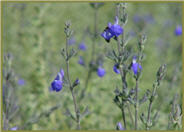
Common name:Germander Sage
Botanical name:Salvia chamaedryoides
This low mounding perennial with a long bloom period, spreads by underground runners. It produces a small, silvery foliage which serves as a background for bright blue flowers. Bruised leaves have a spicy fragrance. Germander Sage reaches 1'-2' tall and wide. Heaviest blooms are in spring and early fall, but intermittent throughout the year. It requires full sun, well draining soil and is drought tolerant once it's established. Do not fertilize.

Common name:Western Redbud
Botanical name:Cercis occidentalis
This deciduous shrub or small tree reaches 15' tall and 10' wide. Beautiful magenta flowers appear in spring, before the leaves appear. Foliage is apple green , turning yellow to red in the fall. Seed pods dangle on this tree in winter. Western Redbud prefers full sun but will appreciate afternoon shade in desert areas. It needs well draining soil. It is drought tolerant once it's established. It attracts hummingbirds and butterflies. A tree of varying interest all year round!

Common name:Yellow Dietes or Fortnight Lily
Botanical name:Dietes bicolor
This clumping perennial iris relative stands 3'-4' high. It has light- yellow, iris-like flowers with maroon blotches that are about 2" wide. It performs best in full sun and in soil with good drainage.

Common name:Mexican Bush Sage, Mexican Sage
Botanical name:Salvia leucantha
The Mexican Sage is a bushy shrub that grows 3'-4' tall and wide. It has hairy white stems, grey-green leaves and velvet-like purple flower spikes that bloom summer through fall. This shrub tolerates sun, light shade, low to moderate water, and is cold hardy to 15 degrees F. The Mexican Sage attracts hummingbirds. Be careful not to overwater.
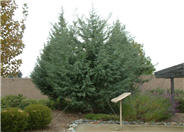
Common name:Arizona Cypress
Botanical name:Cupressus arizonica
This Arizona native conifer tree grows 40'- 50' tall by 20' wide, at moderate rate. Color & form can vary from sea green to silvery blue, pyramidal to round form. It prefers full sun and can tolerate heat, wind & drought. It needs well draining soil. Bark is reddish brown and furrowed. Leaves are tiny and scale like. Cones appear in fall.
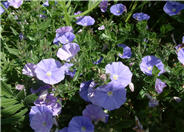
Common name:Ground Morning Glory
Botanical name:Convolvulus sabatius
Convolvulus sabaticus is a perennial that grows 1'-2' high, with branches that spread to 3' or more. It produces blue to lavender flowers with blooms of 1"-2" wide.The soft, evergreen leaves are .5" to 1.5" long.
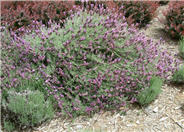
Common name:Otto Quast Spanish Lavender
Botanical name:Lavandula stoechas p. 'Otto Quast'
This lavender grows to 2' tall. The flower spikes are topped with purple bracts. It is drought tolerant - Cornflower Farms
| Designer: Dave Roberts Landscape | Low Water Planting |
Photographer: GardenSoft |
Soils and Compost:
Maintain a two to four inch layer of mulch on the soil surface to reduce weeds, infiltrate rain water, and reduce compaction.
Water Saving Tip:
In general, lawns only need to be watered once every three days.
Check your irrigation controller and reduce watering times if necessary.
Integrated Pest Management:
Attract, or buy beneficial insects such as ladybugs and lacewings to control pest outbreaks in your garden.
